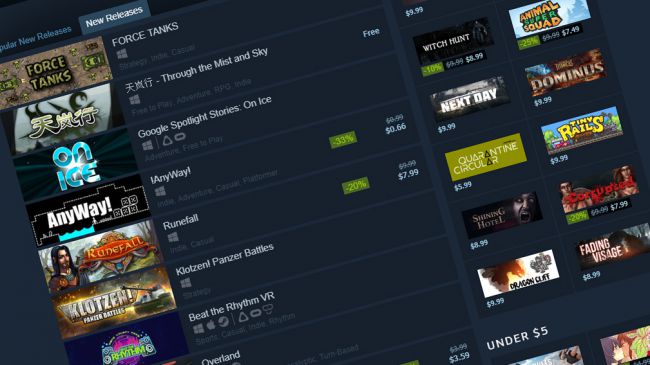The games industry reacts to Valve's divisive Steam Store curation policy
"I choose to leave stuff I consider hateful and horrible on the table. I don’t want Steam to make that decision for me."

Steam's new 'anything goes' policy is doomed from the start, reckons Tyler. Valve's decision to no longer police games on Steam—except for those that are illegal, constitute "trolling," or fail to meet technical quality standards—is a contentious one, which the publisher spent 1,000 words attempting to explain yesterday.
As Tyler posits, implementing this will be difficult. As reported by VG24/7, game designer Brenda Romero supports Valve's "open platform", as she perceives it, and that as a creator she wants access "to the full range of the human experience" when making a game.
"I choose to leave stuff I consider hateful and horrible on the table. I don’t want Steam to make that decision for me," Romero tells VG24/7. "In the history of games, some of our most important works have been deemed highly offensive by broad swaths of the world. Games like GTA, Wolfenstein, Doom, Mortal Kombat, Bully (same sex kiss), God of War (sex), The Sims (didn’t allow same sex characters to become a couple in early versions).
"To me, it comes down to this: I may not like your game, but I support your right to make it. Since Valve controls such a huge percentage of the game ecosystem, these are non-trivial decisions."
University lecturer and indie game developer Robert Yang—whose work on the intersection of art, videogames and gay subculture has been banned on Twitch for its sexual content—suggests so-called 'good' moderation is difficult, but the prospect of zero intervention risks giving hate mobs and scam artists de facto control. Yang also says Valve is "one of the few companies in the world that can literally hire 200 people" to work on moderating its storefront, and thus should be doing more to prevent creators being "intimidated off the platform."
Bennett Foddy, the creator of QWOP and Get Over It, is on the other hand concerned about the implications of allowing corporations, like Valve, to become "enforcers of moral principles." Foddy reckons giving distributors gatekeeping powers has scope to encourage bad decision making on their part.
This Twitter exchange between Foddy and Yang raises some good points.
you're assuming this is still some kind of abstract "slippery slope" hypothetical?... they're *already* picking bad moral norms, they're already governing, they're already giving tacit support to steam nazis to call me a degenerate, these corps are already punishing trans peopleJune 7, 2018
yes they don't have good principles! we already don't trust them! we're already on the way toward a mob-enforced ban of queer people! this hell world is already the default trajectory! but you absolve valve of all responsibility when you relabel *basic safeguards* as gatekeepingJune 7, 2018
and I’m not saying silence is appropriate or that steam isn’t bad, quite the opposite. It’s a question of what we should be demanding, and i think demanding more gatekeeping is likely to turn out to make it even worse in the dimensions we care about, not betterJune 7, 2018
ok yes let's nationalize Steam and pass several anti-harassment laws and hire lawyers to enforce it, but until that wonderful day, we're organizing on twitter by airing grievances -- so that when we're all pressuring our steam reps in the coming months, we'll be on the same pageJune 7, 2018
sure… i just worry that one of the norms that is rapidly being established is that the enforcement of public morals and rights ought to be carried out by unelected handfuls of software engineers, which is how we got here.June 7, 2018
Naomi Clark of the NYU Game Centre bills the overarching "censorship discourse" as "low-grade". She questions Valve's suggestion that it's ethically bound to sell every legal product without curation—something which in turn can impinge on transparency.
Keep up to date with the most important stories and the best deals, as picked by the PC Gamer team.
"This is more of an argument against monopolies, right—it’s inevitably a privatized dictatorship, unless you forcibly change that," says Clark on Twitter. "If we’re inevitably going to have to yell angrily about something, an acknowledged process with transparency is preferable. Which is part of why content moderation is usually veiled in unaccountable secrecy.
"This may point out that transparency of policy is the real issue. But part of what I read in Steam’s blog is a (not uncharacteristic) insistence that 'there isn’t even going to be a policy to discuss, just use our automated filter system'. To me this is a move even further away from transparency than the existing cloister, but I guess we will have to see how they end up banning certain games or shadow-delisting them."
To this end, as games critic Jim Sterling details in his latest video, Steam is set to launch a game named AIDS Simulator next week. Despite Valve's deference to filters and algorithms, this is but one problematic example an unmoderated Steam now faces in the days, months and years to come.

